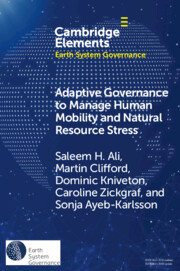Recent surveys of the literature on climate change and migration emphasize the important diversity of outcomes and approaches of the empirical studies. In this paper, we conduct a meta-analysis in order to investigate the role of the methodological choices of these empirical studies in finding some particular results concerning the role of climatic factors as drivers of human mobility. We code 51 papers representative of the literature in terms of methodological approaches. This results in the coding of more than 85 variables capturing the methodology of the main dimensions of the analysis at the regression level. These dimensions include authors' reputation, type of mobility, measures of mobility, type of data, context of the study, econometric methods, and last but not least measures of the climatic factors. We look at the influence of these characteristics on the probability of finding any effect of climate change, a displacement effect, an increase in immobility, and evidence in favor of a direct vs. an indirect effect. Our results highlight the role of some important methodological choices, such as the frequency of the data on mobility, the level of development, the measures of human mobility and of the climatic factors as well as the econometric methodology.

